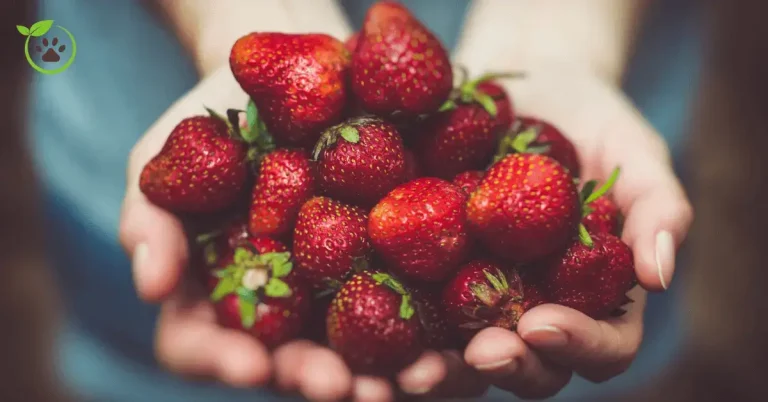Can Guinea Pigs Eat Parsley? Parsley is a versatile herb that many of us use in cooking to make food tasty and healthy, adding flavor and nutrition to our dishes. But have you ever wondered if this vibrant green delight is suitable for your guinea pig’s diet? In this comprehensive guide, we’ll explore the world of parsley for guinea pigs, uncovering its nutritional benefits, potential hazards, and the best practices for serving it to your beloved pets.
The Nutritional Benefits of Parsley for Guinea Pigs
Guinea Pigs Eat Parsley and it is not just a flavorful herb; it’s a nutritional powerhouse, and your guinea pig can enjoy these benefits too. Let’s explore the important nutrients that parsley provides:
- Vitamin C: Guinea pigs, like humans, cannot produce their own Vitamin C, making dietary sources crucial. Parsley is packed with Vitamin C, helping to boost your guinea pig’s immune system and prevent scurvy.
- Vitamin K: This essential vitamin is vital for blood clotting and wound healing, ensuring your guinea pig’s overall well-being.
- Calcium: Parsley contains calcium, which is crucial for developing strong bones and teeth. However, overfeeding high-calcium foods like parsley can lead to urinary issues in guinea pigs, so moderation is key.
- Potassium: Important for water retention and muscle and nerve function, potassium in parsley helps keep your guinea pig’s body in balance.
- Flavonoids & Antioxidants: Parsley is rich in flavonoids and antioxidants that boost your guinea pig’s immune system, prevent diseases, and offer anti-inflammatory properties.
Parsley’s Nutritional Offering for Guinea Pigs
Guinea Pigs Eat Parsley and it is a herb that’s rich in nutrients and is beneficial for humans and guinea pigs. The upcoming table will present the specific nutritional content of parsley per 100 grams. This will help readers understand how parsley can be a healthy addition to the diet for both people and guinea pigs.
| Nutrient | Value |
| Calories | 36 kcal |
| Vitamin A | 8420 IU |
| Protein | 2.97 g |
| Vitamin C | 133 mg |
| Vitamin K | 1640 µg |
| Calcium | 138 mg |
| Fiber | 3.3 g |
| Magnesium | 50 mg |
| Potassium | 554 mg |
| Sugar | 0.85 g |
| Iron | 6.2 mg |
| Fat | 0.79 g |
Serving Parsley to Your Guinea Pig: Best Practices
Guinea Pigs Eat Parsley best practice for serving parsley is undeniably nutritious, it should be a part of a balanced diet rather than a guinea pig’s primary food source. The serving size and frequency are critical to ensure your guinea pig’s health:
- Serving Size: Offer 5-10 sprigs of parsley at a time. This ensures they receive the benefits without overloading on calcium and oxalic acid.
- Frequency: Guinea pigs can enjoy parsley 2-3 times a week. This routine strikes a balance between reaping the benefits and avoiding potential health issues.
- Variety Is Key: Along with parsley, provide your guinea pig with other guinea pig-safe vegetables like lettuce, zucchini, cucumber, and bell peppers to create a complete and diverse diet.
Is parsley bad for guinea pigs?
No, Parsley is a good addition to guinea pigs diet. Parsley is a rich source of vitamins and minerals that is necessary part of guinea pigs diet.

However, it should not make it a part of their daily diet because it contains oxalic acid and guinea pigs suffer lot of health issues due to extra amount of oxalic acid. Guinea pig diet not contains 50 grams of oxalic acid.
Risks Of Over Feeding Parsley To Guinea Pigs
Guinea pigs enjoy parsley; however, while parsley can provide valuable nutrients for their diet, there are specific risks to be aware of when including this herb in their meals.
When you feed parsley to your guinea pigs, watch out for some risks. Guinea pigs usually enjoy parsley, but it has a lot of calcium, which can result in bladder and kidney stones. To keep your little companions healthy, be aware of these dangers and make smart choices in their diet.
The major problems are:
Digestive Disturbances
Digestion problems like indigestion, diarrhea, constipation, and gastrointestinal discomfort can arise in guinea pigs when their diet is imbalanced or they consume excessive amounts of certain foods. Overfeeding parsley, for example, can lead to digestive issues, resulting in symptoms such as:
- Diarrhea
- Upset stomach
- Dehydration
- Vomiting
- Increased gas
Monitoring your furry companions for signs of distress and making necessary dietary adjustments is essential for maintaining their digestive health. While parsley provides valuable nutrients, its high calcium content is better suited for young guinea pigs.
Bladder Stone formation
Although parsley contains valuable nutrients, its high calcium content can pose a problem for adult guinea pigs. Excessive calcium intake can result in the formation of bladder stones, leading to painful symptoms like blood in the urine, painful urination, and urinary tract infections. While calcium is beneficial for baby guinea pigs, it’s best to feed parsley to adults in moderation to avoid the risk of bladder issues caused by the binding of calcium with oxalic acid.
Pesticides
Many plants, including herbs like parsley, are often treated with pesticides. Guinea pigs are sensitive to pesticides, so always wash parsley and herbs thoroughly before feeding them to your pets to ensure their safety and well-being.
The Risk of Renal System Failure in Guinea Pigs
Oxalic acid, in and of itself, doesn’t pose an immediate threat to guinea pigs. However, excessive consumption of oxalic acid-rich foods can prove harmful to these small creatures. Guinea pigs have a limited capacity to process oxalic acid each day. Should they exceed this threshold, it can lead to severe consequences such as the failure of their renal system. Sadly, such damage is typically irreversible and can ultimately result in the loss of your beloved pet.

Parsley is generally considered safe for guinea pigs, but it’s important to exercise caution in terms of portion size. Despite its unassuming appearance, parsley is packed with nutrition. To maintain your guinea pigs well being, it is important to feed them this herb in moderation.
Is parsley good for guinea pigs?
Yes, Parsley is a excellent food for your pet guinea pigs. Here we discuss some important parsley health benefits for Guinea pig
- Prevention of Scurvy: Scurvy is a vitamin C deficiency disease that affects guinea pigs. Parsley’s high Vitamin C content, with just a small amount providing a significant portion of their daily requirement, makes it a valuable addition to their diet. By including parsley, you can help strengthen your guinea pig’s immune system and reduce the risk of scurvy, one of the most commonly diagnosed health issues in these animals.
- Improved Eyesight: The Vitamin A found in parsley is essential for maintaining good eyesight and overall eye health in guinea pigs. Guinea pigs often face age-related eyesight problems, and parsley’s contribution can help preserve their vision.
- Quick Recovery of Wounds: Guinea pigs may occasionally sustain minor injuries, especially if they are housed with other guinea pigs. Parsley’s Vitamin K content aids in blood clotting, promoting rapid recovery from wounds. It helps prevent excessive bleeding and ensures your guinea pigs heal more quickly from minor injuries.
- Healthy Body Growth: Parsley is packed with essential nutrients like calcium, iron, potassium, and phosphorous. These nutrients play a crucial role in various bodily functions. Calcium supports bone health, iron prevents anemia, potassium regulates fluid balance and muscle function, and phosphorous aids in energy metabolism and nutrient utilization. By providing your guinea pigs with these nutrients through parsley, you contribute to their overall health and robust growth.
How much parsley can guinea pigs eat?
The amount of parsley needed depends on the size and age of the guinea pig. Young guinea pigs require an extra amount of calcium for bone growth as they are still developing, so they benefit from a higher quantity of parsley.
However, mature and larger guinea pigs require a moderate amount of parsley, typically 2 to 3 times a week, as they need less calcium compared to their younger counterparts.
Can guinea pigs eat parsley leaves?
Yes, guinea pigs eat parsley leaves because leaves are full of essential vitamins and antioxidants. It’s easy to control portions to prevent overeating. Make sure to wash the leaves to remove any pesticides and only give your guinea pigs fresh parsley leaves. In small amounts, parsley can be a healthy treat for guinea pigs because of its valuable vitamins and minerals.
Can guinea pigs eat parsley stems?
Yes, guinea pigs eat parsley stems, and these stems offer various nutritional benefits. While there might be some debate among guinea pig owners about the impact of parsley stems on their pets’ digestion, parsley stems do not contain toxic compounds. In fact, parsley stems can have a more pronounced bitter flavor than the leaves, which some guinea pigs may enjoy due to their chewy texture. If your guinea pig doesn’t like parsley stems, you can feed them the leaves.

Can guinea pigs eat parsley flakes?
No, Guinea pigs can not eat parsley flakes because it includes some ingredients that are not suitable for Guinea pigs.
Can guinea pigs eat parsley root?
Yes, Guinea pigs can eat parsley roots but in moderation. Parsley roots are rich in fiber and can help boost the digestion and liver function.

Can guinea pigs eat dried parsley?
No, Guinea pigs can not eat dried parsley because their are many nutrients that are nor present in dried parsley.
Can guinea pigs eat parsley flakes?
No, guinea pigs can’t eat parsley flakes. Because flakes contain preservatives and some other ingredients which are bad for your guinea pig’s health.
Is Curly Parsley Good For Guinea Pigs?
Yes, curly parsley is safe and suitable for guinea pigs. It provides many of the same nutritional benefits as flat-leaf parsley. Curly parsley is rich in vitamins, particularly vitamin C, which is essential for guinea pigs, as they cannot produce this vitamin on their own.
Is Flat Leaf Parsley Good For Guinea Pigs?
Yes, flat-leaf parsley is a safe and nutritious option for guinea pigs. Like curly parsley, it contains essential vitamins and minerals, particularly vitamin C, which is vital for guinea pigs since they cannot produce this vitamin on their own. Flat-leaf parsley can be a part of a well-balanced diet for guinea pigs.
Suitable Parsley Varieties for Guinea Pigs
There are different types of parsley that includes:
- Flat-leaf parsley
- Curly leaf parsley
- Cow parsley
- Chinese parsley
Guinea pigs eat parsley that can safely eat flat-leaf parsley and curly leaf parsley, which are two common varieties of parsley. These parsley types are considered safe for guinea pigs, but it’s crucial to provide them in moderation. One reason for caution is that parsley contains high levels of calcium, which, when consumed excessively, can lead to health issues in guinea pigs.
On the other hand, cow parsley, also known as wild chervil, is not suitable for guinea pigs. It’s a different plant species and is not recommended as part of their diet.
Chinese parsley, which is also known as cilantro or coriander, is not the same as the flat-leaf or curly leaf parsley varieties. While guinea pigs can have cilantro or coriander as an occasional treat in small amounts, it’s essential to remember that it’s a distinct herb from parsley.
Guinea pigs eat parsley but keep in mind when offering parsley or any other herbs to guinea pigs, ensure that they are fresh, thoroughly washed, and free from pesticides to maintain the well-being and health of your pets.
Can Guinea Pigs eat Parsley Everyday?
Guinea Pigs eat Parsley but feeding parsley to guinea pigs every day may not be the best practice, as moderation is key when it comes to any treat or herb in their diet. While parsley is generally safe and nutritious for guinea pigs, consuming it every day in large quantities can lead to certain health issues. It’s essential to maintain a balanced and varied diet for your guinea pigs.
Here are a few reasons why you shouldn’t feed parsley to guinea pigs every day:
- Calcium Content: Parsley is relatively high in calcium, which can be beneficial for young guinea pigs but excessive for adults. Overconsumption of calcium can lead to bladder stone formation, which is painful and can be dangerous.
- Oxalic Acid: Parsley contains oxalic acid, which, if consumed in excess, can lead to renal system failure. Guinea pigs can only digest a limited amount of oxalic acid each day.
- Variety is Key: Guinea pigs require a variety of vegetables and herbs to ensure they get a wide range of nutrients. Feeding them the same food every day may lead to nutritional imbalances.
It’s advisable to offer parsley as an occasional treat, not a daily staple. One or two times a week is a reasonable frequency. Remember to provide other vegetables and herbs to ensure a well-rounded diet for your guinea pigs
Conclusion
Guinea pigs can safely enjoy parsley, but it should be given in moderation. Parsley offers essential nutrients, including Vitamin C for a strong immune system and Vitamin A for healthy vision. However, excessive parsley consumption can lead to issues like bladder stones due to its high calcium content and potential renal system failure due to oxalic acid. To keep guinea pigs healthy, offer parsley in limited quantities and maintain a diverse diet with various vegetables and herbs. Properly wash parsley to remove pesticides and serve fresh leaves or stems. Monitoring for digestive problems is crucial. Understanding the benefits and risks of parsley ensures guinea pigs lead happy, healthy lives while occasionally enjoying this treat.







